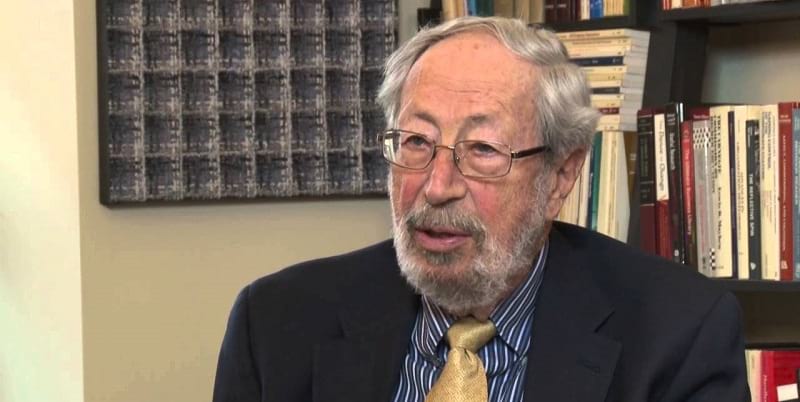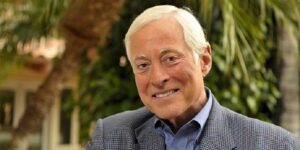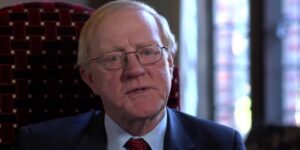Edgar Schein biografie en boeken

Edgar Schein (Edgar Henry Schein) (1928 – 2023) was een Emeritus Professor die verbonden is aan de MIT Sloan School of Management. Zijn levenswerk was met name gericht op het gebied van organisatieontwikkeling. Edgar Schein is vooral bekend geworden met de ontwikkeling van het z’n organisatie cultuurmodel en de 10 dimensies van een lerende organisatie.
De biografie van Edgar Schein
In 1947 behaalde Schein zijn bachelordiploma (B.A.) aan de Universiteit van Chicago. In 1949 behaalde hij zijn masterdiploma (M.A.) psychologie aan de Stanford Universiteit.
Uiteindelijk promoveerde Edgar Schein in 1952 aan de Harvard Universiteit in de sociale psychologie.
Aanvankelijk was hij hoofd van de afdeling sociale psychologie van het Walter Reed Army Institute of Research, daarna was hij van 1952 tot 1956 kapitein in het Amerikaanse leger. In 1956 trad hij in dienst bij de MIT Sloan School of Management en in 1964 werd hij benoemd tot hoogleraar in de organisatiepsychologie en management.
Tussen 1968 en 1971, was Schein verbonden aan het MIT als universitair hoofddocent Planning voor de bacheloropleidingen; in 1972 werd hij voorzitter van de vakgroep organisatieonderzoek aan de MIT Sloan School, een positie die hij tot 1982 heeft bekleed.
Tijdens zijn loopbaan heeft hij onderzoek gedaan naar cultuur, organisatie en loopbaanontwikkeling, de lerende organisatie en verandering. Edgar Schein is een zeer productief onderzoeker, schrijver, docent en consultant.
Naast de vele artikelen in vakbladen, schreef hij ook nog eens veertien boeken. Schein heeft verschillende onderscheidingen en prijzen voor zijn werk ontvangen, de meest recente hiervan zijn de distinguished Scholar-Practitioner Award van de Academy of Management, 2009, de Lifetime Achievement Award in Workplace Learning (2012) en een eredoctoraat van de IEDC Bled School of Management in Slovenië(2012).
Bekende quotes
- “The only thing of real importance that leaders do is to create and manage culture. If you do not manage culture, it manages you, and you may not even be aware of the extent to which this is happening.”
- “If you have been trying to make changes in how your organization works, you need to find out how the existing culture aids or hinders you.”
- “We tend to think we can separate strategy from culture, but we fail to notice that in most organizations strategic thinking is deeply coloured by tacit assumptions about who they are and what their mission is.”
- “In most organizational change efforts, it is much easier to draw on the strengths of the culture than to overcome the constraints by changing the culture.”
- “We do not think and talk about what we see; we see what we are able to think and talk about.”
- “Humble Inquiry is the fine art of drawing someone out, of asking questions to which you do not already know the answer, of building a relationship based on curiosity and interest in the other person.”
- “Culture is the deeper level of basic assumptions and beliefs that are shared by members of an organization, that operate unconsciously and define in a basic ’taken for granted’ fashion an organization’s view of its self and its environment.”
- “Culture is not a surface phenomenon, it is our very care.”
- “I am defining leadership in terms of the role, not the position.”
Publicatie en boeken van Edgar Schein et al.
- 2016. Becoming American. iUniverse.
- 2016. Humble Consulting: How to Provide Real Help Faster. Berrett-Koehler Publishers.
- 2013. Humble Inquiry: The Gentle Art of Asking Instead of Telling. Berrett-Koehler Publishers.
- 2013, 1990. Career Anchors: The Changing Nature of Careers Self Assessment. Pfeiffer.
- 2011. Helping: How to Offer, Give, and Receive Help. Berrett-Koehler Publishers.
- 2010, 2004. Organizational culture and leadership. Wiley.
- 2006. Organization Development: A Jossey-Bass Reader. Wiley.
- 1999. The Corporate Culture Survival Guide. Jossey-Bass.
- 1999, 1988. Process consultation revisited: Building the helping relationship. Addison-Wesley.
- 1999. Sense and nonsense about culture and climate. Sloan School of Management, Massachusetts Institute of Technology.
- 1996. Culture: The missing concept in organization studies. Administrative science quarterly, 229-240.
- 1996. Three cultures of management: The key to organizational learning. Sloan management review, 38(1), 9-20.
- 1996. Career anchors revisited: Implications for career development in the 21st century. The Academy of Management Executive, 10(4), 80-88.
- 1996. Kurt Lewin’s change theory in the field and in the classroom: Notes toward a model of managed learning. Systems Practice, 9(1), 27-47.
- 1996. Organizational learning: what is new?. Sloan School of Management, Massachusetts Institute of Technology.
- 1993. On dialogue, culture, and organizational learning. Organizational dynamics, 22(2), 40-51.
- 1993. Does Japanese management style have a message for American managers?. DE GRUYTER STUDIES IN ORGANIZATION, 335-335.
- 1993. How can organizations learn faster? The challenge of entering the green room. Sloan Management Review, 34(2), 85-92.
- 1988. Organizational culture.
- 1987. The clinical perspective in fieldwork. Sage Publications, Inc.
- 1986. What you need to know about organizational culture. Training & Development Journal.
- 1985. Defining organizational culture. Classics of organization theory, 3, 490-502.
- 1985. How culture forms, develops, and changes. Gaining control of the corporate culture, 17-43.
- 1984. Coming to a new awareness of organizational culture. Sloan management review, 25(2), 3-16.
- 1983. The role of the founder in creating organizational culture. Organizational dynamics, 12(1), 13-28.
- 1978. Career dynamics.
- 1977. Toward a theory of organizational socialization.
- 1975. Improving the quality of work life: career development. publisher not identified.
- 1972. Professional Education: Some New Directions.
- 1971. The individual, the organization, and the career: A conceptual scheme. The Journal of Applied Behavioral Science, 7(4), 401-426.
- 1969. Process consultation: Its role in organization development.
- 1967. Organizational socialization and the profession of management. Sloan Management Review, 30.
- 1965. Organizational psychology.
- 1965. Personal and organizational change through group methods: The laboratory approach. Wiley.
- 1961. Coercive persuasion.
- 1961. Management development as a process of influence. Industrial Management Review.
- 1956. The Chinese indoctrination program for prisoners of war. Psychiatry: Journal for the Study of Interpersonal Processes.
Citatie voor dit artikel:
Van Vliet, V. (2017). Edgar Schein. Retrieved [insert date] from Toolshero: https://www.toolshero.nl/bekende-auteurs/edgar-schein/
Gepubliceerd op: 02/09/2017 | Laatste update: 24/05/2023
Wilt u linken naar dit artikel, dat kan!
<a href=”https://www.toolshero.nl/bekende-auteurs/edgar-schein/”> Toolshero: Edgar Schein</a>












